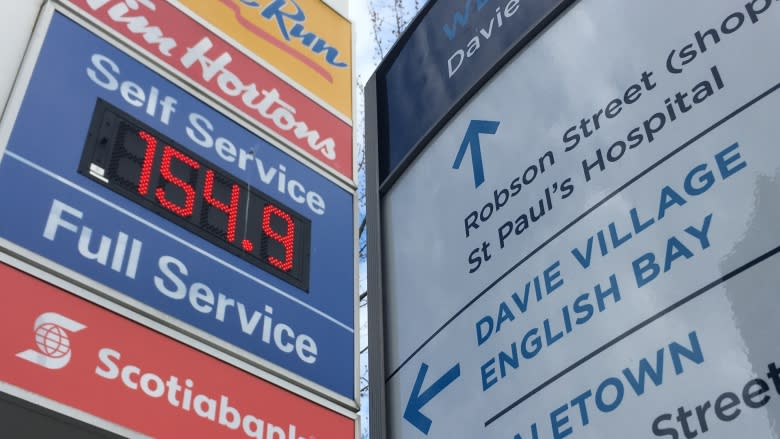Pipeline pressure: Experts divided on whether Trans Mountain expansion would lower gas prices
As Metro Vancouver gas prices approach record highs, protesters continue to be arrested for opposing the Kinder Morgan Trans Mountain pipeline expansion in Burnaby.
But could that very pipeline be the solution to the Lower Mainland's chronically high prices at the pumps? It depends who you ask.
Experts generally agree that expanding the pipeline would have some downward effect on regional gas prices.
But Mark Jaccard, a sustainable energy economist at Simon Fraser University and former chair of the B.C. Utilities Commission, says it would be far from an overnight fix.
"This is quite a short-run phenomenon that's happening right now, so the question is, how do you address that?" Jaccard said. "What's your long-run strategy versus short-run?"
Vulnerable supply lines
The current spike in prices, analysts say, is due primarily to the temporary closures of Burnaby's Parkland refinery and a section of the Olympic pipeline in the United States, both for maintenance. According to Jaccard, these sources account for about half the region's gasoline supply.
Stewart Muir, executive director of Resource Works, a group that promotes the province's resource sector, says this most recent spike highlights the vulnerability in Vancouver's supply lines.
"When we have these kinds of events occur, we see them magnified in their impact on prices," Muir sad. "That's why we have the highest prices in North America right now."
Jaccard says provincial and regional sales taxes on fuel also contribute to the region's notoriously high gas prices, though he notes that a number of other jurisdictions are starting to adopt carbon taxes on fuel — including Alberta.
Special delivery
With half of the region's supply lines temporarily down, that leaves gasoline buyers dependent on the other half — which, according to Jaccard, comes from the existing Kinder Morgan pipeline from Alberta.
The pipeline is designed to move both refined and unrefined petroleum products. In a statement emailed to CBC News, Kinder Morgan says refined products such as gasoline and other fuels have accounted for about 15 per cent of the pipeline's throughput for the last several years — about 50,000 barrels a day.
The proposed expansion would triple the pipeline's capacity, but the new line would be dedicated almost exclusively to moving unrefined product destined for international markets, Kinder Morgan said.
Despite that, Muir says the additional capacity for unrefined product means the existing pipeline could be used to move a higher volume of refined product — if the market called for it.
"If there is demand for gasoline in Vancouver, the market will supply that gasoline," Muir said. "Right now, it can't. It's physically not possible, and that's why we see the high prices."
"If we can solve that constraint by expanding the ability of the product to be sent here, then those who refine it and sell it, the marketers of it, will be able to do that."
Oilsands infrastructure
But Jaccard says lowering gas prices shouldn't be the primary concern about a project that, at its heart, is intended to increase development of the Alberta oilsands — something critics say is incompatible with Canada's stated climate change and emissions goals.
"The pipeline is about expanding the oilsands, so you have to ask yourself if you want to expand something that you later on want to close down," Jaccard said.
"To make an infrastructure investment like this to expand the oilsands is really questionable [on] the part of the federal government."
Regardless of what happens, Jaccard expects gas prices to remain relatively high in the Lower Mainland for the foreseeable future.
For those feeling the pinch at the pump, he recommends buying a hybrid or electric vehicle, which he says are becoming increasingly more affordable, especially when their lower long-term operating costs are taken into account.
"If you're looking at this and saying, oh, I want to build a pipeline to get lower gasoline prices so I can drive a car, I would think again," Jaccard said.
"I would think about, should I still be buying gas guzzlers?"
With files from CBC Radio One's The Early Edition and B.C. Almanac.



